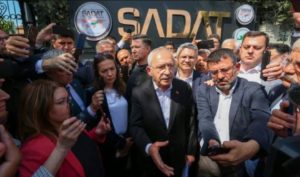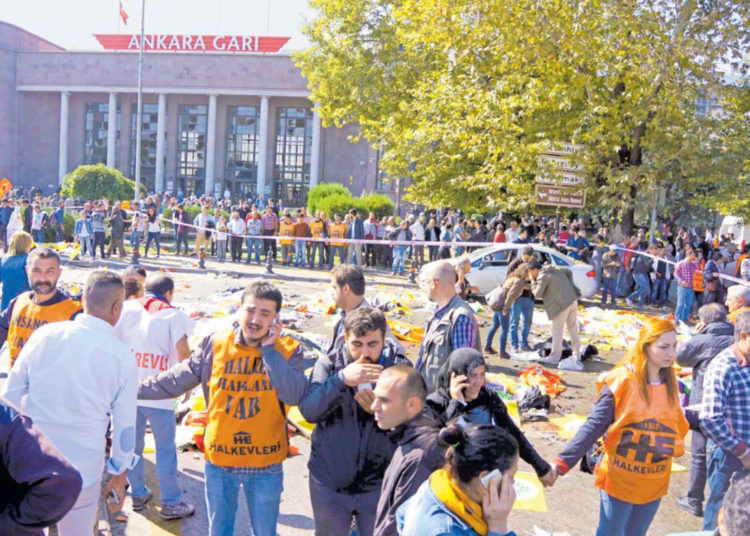Abdullah Bozkurt/Stockholm
A US Embassy warning about possible violence at rally organized by an opposition party, which prompted an unusually strong rebuke from the government of President Recep Tayyip Erdoğan, recalls the specter of terrible months in 2015 when Turkey was hit with a wave of terror that many believed was orchestrated by Turkish intelligence agency MIT to help the then-embattled Erdoğan.
“A large demonstration organized by the opposition Republican People’s Party (CHP) party is scheduled to take place in Maltepe, on the Asian side of Istanbul, Saturday evening, May 21,” said the alert posted on the US Embassy website on May 18.
Noting that Turkish police had used measures to control crowds such as water cannon, tear gas and non-lethal projectiles in the past, the embassy warned that “there is a strong possibility similar measures will be employed at this demonstration” and advised US citizens to “avoid demonstrations and protests as they can be unpredictable and at times become violent.”
The embassy had posted similar warnings before, three in April alone, again for demonstrations and rallies that carry risks for US citizens. It advised them to avoid not only large gatherings but also areas surrounding the US Embassy and consulate buildings. It urged citizens to exercise heightened caution in locations where US citizens or foreigners may gather.
Ankara reacted to the last warning issued by the embassy and summoned US Ambassador to Turkey Jeff Flake to express its dismay. Turkish media reported that the US envoy was told that the warning “created a misperception of Turkey suffering from a serious problem” and it was “something unacceptable.”
US Embassy alert posted on the embassy’s official website:
Pro-government pundits, appearing on government-controlled media outlets, branded the warning as overt political interference in Turkey’s domestic affairs. They highlighted police violence in the US as well.
In an unusual retaliatory move, the General Directorate of Security (Emniyet), the main law enforcement agency in Turkey, as well as the Foreign Ministry issued separate warnings for Turkish citizens in the US, highlighting the risks associated with large gatherings in that country.
The statement issued by the Emniyet, a Turkish name for the police, on May 22 claimed that American police use real bullets and electroshock weapons against protestors and advised Turks to stay away from crowds. The statement issued by the Foreign Ministry on the same day repeated identical points.
Although the US Embassy referred to a specific gathering in Istanbul, the Turkish government’s warnings carried no specifics and did not name any venue or protest.
Turkish police warning for Turkish nationals living in the US:
Turkish Foreign Ministry’s statement about risks for Turks in the US:
In the meantime, the US State Department still keeps Turkey at level 2 on its travel advisory list, urging caution for travel to Turkey over terrorism and arbitrary detentions. The warning came in the aftermath of the imprisonment and detention of a number of US citizens in Turkey on fabricated charges.
In recent years Western diplomats and embassies, especially the US Embassy, have been repeatedly targeted by Turkish officials, primarily Interior Minister Suleyman Soylu, whose job it is to protect foreign embassies, consulates and diplomats in Turkey. Soylu, a hard-core nationalist, has publicly bashed the US many times, describing America as a threat and accusing Western ambassadors of trying to undermine Turkey.
On December 21, 2021 the Turkish interior minister publicly targeted the US Embassy in Ankara and accused the American ambassador of stirring up trouble in Turkey::
A similar pattern was observed in 2015 and 2016, when the US Embassy issued several alerts on possible terrorist threats in Turkey and at times scaled back its services over security concerns.
It turned out that some of the major terrorist attacks, blamed on the Islamic State in Iraq and Syria (ISIS), were in fact orchestrated by Turkish intelligence as part of clandestine operations to help Erdoğan regain a majority in the Turkish parliament.
Based on confidential government documents, Nordic Monitor previously reported that the mastermind behind a string of ISIS terrorist attacks including the deadliest in Turkey’s history had been working with the National Intelligence Organization (Milli İstihbarat Teşkilatı, or MIT). The report detailed secret meetings of ISIS Emir İlhami Balı (better known by his nom de guerre Abu Bakr or Ebu Bekir) with MIT officials in Ankara in May 2016 while he was wanted and on the run.
The documents suggested Balı’s actions were directed by MIT, which coordinated clandestine operations within ISIL for political goals.
According to various court indictments reviewed by Nordic Monitor, Balı planned and directed major terrorist attacks in Turkey that resulted in the death of nearly 200 people. Three deadly attacks that took place in 2015 and killed 142 people carried the signature of Balı, who was listed as the number one suspect in a suicide bomb attack ― the deadliest in Turkey’s history ― on October 10, 2015 in Ankara. The explosion killed 105 civilians, including the two suicide bombers, as ISIL militants targeted NGOs and the supporters of left-wing and pro-Kurdish parties who were holding a peace rally outside the city’s main train station just weeks ahead of the November 1, 2015 snap election. An ISIL suicide attack in the town of Suruç on July 21, 2015 that left 33 dead was also planned by Balı, according to Turkish authorities.

The ISIL chief’s fingerprints were also traced to a suicide bombing and shootings at Istanbul Atatürk Airport on June 28, 2016 that killed 48 people including the three attackers. The urgent cable that was dispatched to MIT units across Turkey by the agency’s General Intelligence Directorate on July 4 highlighted a phone intercept that pointed to Balı’s possible role.
The intelligence note also underlined that Balı had been searching for an opportunity to stage a terrorist attack in Europe in early 2016. He was alleged to be connected to ISIL attackers in Brussels, although no detailed information was provided on the nature of this alleged relationship. He was also tied to a suicide bombing that took place on Istiklal Street in Istanbul’s major tourist area of Beyoğlu on March 19, 2016 and killed five people, two of whom were of dual Israeli-US citizenship.
The 2015 ISIL attacks that were coordinated by Balı had greatly benefited the government of Turkish President Erdoğan. The president, who lost his majority in parliament in the June 2015 general election for the first time in 13 years of rule in Turkey, was able to regain the lost votes in early elections on November 1, 2015. Between the two elections, major ISIL attacks masterminded by Balı took place. Turkish voters who defected from Erdoğan’s party in June 2015 were intimidated by the attacks and returned to the fold to support Erdoğan due to security concerns.
Following the October 2015 terrorist attack in Ankara, then-Prime Minister Ahmet Davutoğlu said the popularity of the governing Justice and Development Party (AKP) had increased in the aftermath of the incident. Appearing on public television, Davutoğlu said the government could not arrest suicide bombers until they acted, even though the government had a list of names of potential suicide bombers.
Ousted from the government and made a pariah within the ruling party over a power grab dispute with Erdoğan, Davutoğlu is now leading a splinter party called Gelecek (Future). After parting ways with Erdoğan, Davutoğlu said if he were to reveal what happened between the two elections in 2015 with respect to terrorism, those who criticize him would be ostracized. “If the books on the fight against terror are opened, people who criticized us won’t be able to show themselves in public,” Davutoğlu said on August 23, 2019. It was not clear what he was implying, but the Turkish opposition called on him to reveal what he knows about the period in 2015 that was marred by back-to-back terrorist attacks.

Ahead of national and presidential elections next year, many in the opposition are concerned that Erdoğan may again resort to violence and terror to intimidate voters and prevent defections from his party’s base. Considering that his government faces frustrated Turks who feel the pinch from a troubled economy amid rising unemployment, soaring food and energy prices and the rapid decline of the local currency, he may be desperate to sabotage the election campaigns of the opposition parties.
On May 20 main opposition Republican People’s Party (CHP) Chairman Kemal Kılıçdaroğlu showed up in front of the building housing the offices of paramilitary group SADAT International Defense Consultancy, a company linked to the president, and said SADAT would be the culprit if an incident were to threaten election security in the 2023 polls.
SADAT was established by Erdoğan’s former chief military advisor Adnan Tanrıverdi in 2002 and has been involved in a number of conflicts from Libya to Syria to support Islamist groups. “This organization also trains [people] for unconventional warfare, namely sabotage, raids, ambush, destruction, assassination and terror. It is an organization that trains terrorists,” Kılıçdaroğlu told members of the press.
“If anything happens to disrupt the security of the elections, SADAT and the palace [Erdoğan] will be responsible,” the CHP leader warned.













